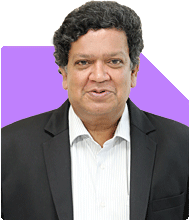Can I Lower My High Blood Pressure After Taking Telmisartan for Years?
Dr Chandrakant Lahariya | Answer |Ask -Follow
Diabetologist, Consultant Physician, Vaccine Expert - Answered on Oct 22, 2024
The Delhi-based senior physician also has over 20 years of experience in hypertension, thyroid disorders and respiratory illnesses.
An expert on common health issues and the preventive aspects of medicine, he has co-authored the book, Till We Win: India's Fight Against The Covid-19 Pandemic.
Dr Chandrakant completed his MBBS from the Maulana Azad Medical College, New Delhi, and his MD from the Lady Hardinge Medical College, New Delhi.
He has a DNB (National Board of Examination, 2009) certification and a diploma in vaccinology from Institut Pasteur, Paris.... more

I am 49 age male. I have BP 150/95. Then our family doctor started Telmisartan 40 mg tab/per day. I have taken this tab since 2-3 year. Still now my BP is 150/100. My father also have high BP. Kindly suggest.
You need atleast two medicines and modifications in lifestyle by diet and physical activity.
Follow DASH diet.
You may like to see similar questions and answers below
Roopashree Sharma | Answer |Ask -Follow
Yoga, Naturopathy Expert - Answered on Mar 17, 2023
Dr Ashit Hegde | Answer |Ask -Follow
Consultant Physician, Internal Medicine and Critical Care Expert - Answered on Mar 30, 2023
Dr Karthiyayini Mahadevan | Answer |Ask -Follow
General Physician - Answered on Oct 08, 2024
Dr Chandrakant Lahariya | Answer |Ask -Follow
Diabetologist, Consultant Physician, Vaccine Expert - Answered on Oct 28, 2024
Dr Chandrakant Lahariya | Answer |Ask -Follow
Diabetologist, Consultant Physician, Vaccine Expert - Answered on Nov 01, 2024
Nitin Narkhede |113 Answers |Ask -Follow
MF, PF Expert - Answered on Dec 15, 2025
Nitin Narkhede |113 Answers |Ask -Follow
MF, PF Expert - Answered on Dec 15, 2025
Ramalingam Kalirajan |10893 Answers |Ask -Follow
Mutual Funds, Financial Planning Expert - Answered on Dec 15, 2025
Ramalingam Kalirajan |10893 Answers |Ask -Follow
Mutual Funds, Financial Planning Expert - Answered on Dec 15, 2025
Radheshyam Zanwar |6746 Answers |Ask -Follow
MHT-CET, IIT-JEE, NEET-UG Expert - Answered on Dec 15, 2025
Ramalingam Kalirajan |10893 Answers |Ask -Follow
Mutual Funds, Financial Planning Expert - Answered on Dec 15, 2025
Ramalingam Kalirajan |10893 Answers |Ask -Follow
Mutual Funds, Financial Planning Expert - Answered on Dec 15, 2025
Ramalingam Kalirajan |10893 Answers |Ask -Follow
Mutual Funds, Financial Planning Expert - Answered on Dec 15, 2025
Samraat Jadhav |2508 Answers |Ask -Follow
Stock Market Expert - Answered on Dec 15, 2025
Ramalingam Kalirajan |10893 Answers |Ask -Follow
Mutual Funds, Financial Planning Expert - Answered on Dec 15, 2025



























